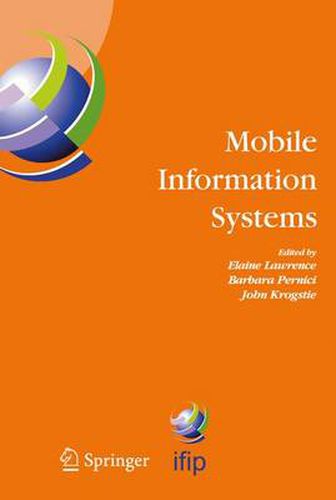Readings Newsletter
Become a Readings Member to make your shopping experience even easier.
Sign in or sign up for free!
You’re not far away from qualifying for FREE standard shipping within Australia
You’ve qualified for FREE standard shipping within Australia
The cart is loading…






This title is printed to order. This book may have been self-published. If so, we cannot guarantee the quality of the content. In the main most books will have gone through the editing process however some may not. We therefore suggest that you be aware of this before ordering this book. If in doubt check either the author or publisher’s details as we are unable to accept any returns unless they are faulty. Please contact us if you have any questions.
Mobility is perhaps the most important market and technological trend within information and communication technology. With the advent of new mobile infrastructures providing higher bandwidth and constant connection to the network from virtually everywhere, the way people use information resources is predicted to be radically transformed. Over the last years, a new breed of information systems, referred to as mCommerce systems or mobile information systems, has appeared to address this emerging situation. In 2000, the IFIP 8.1 WG decided to look into establishing a task group to look closer at this area, and the idea was adopted and extended by IFIP TC8 the following year. After the arrangement of several workshop, this task group has been the driving force behind the arrangement of MOBIS (IFIP TC 8 Working Conference on Mobile Information systems) held in Oslo, Norway, 15-17 September 2004. The objective of the working conference was to provide a forum for researchers and practitioners interested in planning, analysis, design, construction, modification, implementation, utilization, evaluation, and management of mobile information systems to meet, and exchange research ideas and results. Specifically, we tried to use the working conference to * Clarify differences and similarities between the development of mobile vs. more traditional information systems * Investigate organizational impact of mobile information systems * Investigate mobile commerce applications combined with the advantages of mobile communications technologies X Mobile Information Systems * Evaluate existing and newly developed approaches for analysis, design, implementation, and evolution of mobile information systems.
$9.00 standard shipping within Australia
FREE standard shipping within Australia for orders over $100.00
Express & International shipping calculated at checkout
This title is printed to order. This book may have been self-published. If so, we cannot guarantee the quality of the content. In the main most books will have gone through the editing process however some may not. We therefore suggest that you be aware of this before ordering this book. If in doubt check either the author or publisher’s details as we are unable to accept any returns unless they are faulty. Please contact us if you have any questions.
Mobility is perhaps the most important market and technological trend within information and communication technology. With the advent of new mobile infrastructures providing higher bandwidth and constant connection to the network from virtually everywhere, the way people use information resources is predicted to be radically transformed. Over the last years, a new breed of information systems, referred to as mCommerce systems or mobile information systems, has appeared to address this emerging situation. In 2000, the IFIP 8.1 WG decided to look into establishing a task group to look closer at this area, and the idea was adopted and extended by IFIP TC8 the following year. After the arrangement of several workshop, this task group has been the driving force behind the arrangement of MOBIS (IFIP TC 8 Working Conference on Mobile Information systems) held in Oslo, Norway, 15-17 September 2004. The objective of the working conference was to provide a forum for researchers and practitioners interested in planning, analysis, design, construction, modification, implementation, utilization, evaluation, and management of mobile information systems to meet, and exchange research ideas and results. Specifically, we tried to use the working conference to * Clarify differences and similarities between the development of mobile vs. more traditional information systems * Investigate organizational impact of mobile information systems * Investigate mobile commerce applications combined with the advantages of mobile communications technologies X Mobile Information Systems * Evaluate existing and newly developed approaches for analysis, design, implementation, and evolution of mobile information systems.